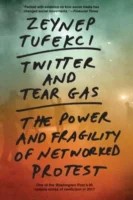A riveting firsthand account and incisive analysis of modern protest, revealing internet-fueled social movements’ greatest strengths and frequent challenges.
 Could the ability to organize massive protests quickly on Facebook and Twitter be making those protests vulnerable in the long term? If new technologies are so empowering, why are so many movements failing to curb authoritarianism’s rise? Is a glut of misinformation more effective censorship than directly forbidding speech? Why are so many of today’s movements leaderless?
Could the ability to organize massive protests quickly on Facebook and Twitter be making those protests vulnerable in the long term? If new technologies are so empowering, why are so many movements failing to curb authoritarianism’s rise? Is a glut of misinformation more effective censorship than directly forbidding speech? Why are so many of today’s movements leaderless?
Zeynep Tufekci answers these questions and more, speaking from direct experience and combining on-the-ground observations with insightful analysis. She explains the role the internet played in the Zapatista uprisings in Mexico, the power of remote Twitter users to organize medical supplies during the Arab Spring, the refusal to use bullhorns in the Occupy Movement that started in New York, and the empowering effect of tear gas in Istanbul’s Gezi Park. She also looks at how governments have responded to the rise of digital tools with their own methods, including misinformation, distraction, and surveillance. Her observations from life inside social movements complete a moving investigation of politics, technology, and culture—and offer essential and surprising insights into the public sphere and future of governance in the 21st century.
Zeynep Tufekci: Twitter and Tear Gas. The Power and Fragility of Networked Protest — Yale University Press, 2017, 360 p., isbn 9780300234176
website – Creative Commons version (pdf)

